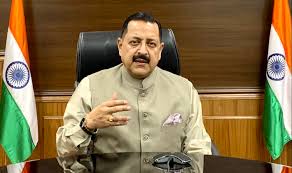
India’s Next Industrial Revolution to be Driven by Biotechnology: Dr. Jitendra Singh
Dr. Jitendra Singh, the Minister of State (Independent Charge) for the Ministry of Science and Technology and Ministry of Earth Sciences, highlighted India’s growing prominence as a global hub for affordable, high-quality healthcare and medical tourism at the 6th CII Pharma and Life Sciences Summit 2024 in New Delhi. Dr Singhoutlined a vision of biotechnology leading the country’s next industrial revolution and emphasized the government's commitment to supporting the biotech sector through venture funds and policies that have fostered the rapid growth of startups in this domain.
“India is emerging as a major player in the bioeconomy, with the number of biotech startups skyrocketing from just 50 in 2014 to over 5,000 now,” Dr. Singh stated. He stressed the need for stronger collaboration between the public and private sectors to create a robust research ecosystem and reiterated that biotechnology would be a pivotal focus for the nation’s industrial advancement. He noted that India's bioeconomy has expanded ten-fold since 2014 and called for an inclusive innovation ecosystem that balances intellectual property, data protection, and clinical trials.
Strengthening India's Position in Global Healthcare and Biotechnology
Dr. Arunish Chawla, Secretary of the Department of Pharmaceuticals, Ministry of Chemicals and Fertilizers, further underscored the significant growth of the pharmaceuticals and biotechnology sectors. “Last month, these sectors became the fourth-largest export manufacturing industry for India,” he announced, adding that India is poised to become a reliable “pharmacy of the world” and a futuristic global leader in biotechnology and life sciences. According to national accounts data, the two sectors generate, on average, twice as much value for output compared to other manufacturing industries, making them a critical part of India's economic strategy.
Dr. Chawla emphasized the need for continued focus on research and development (R&D) and an effective regulatory system, particularly in the biologics and biosimilar space. He highlighted that India is now exporting more bulk drugs than it is importing—a testament to the country’s increasing self-reliance and manufacturing capabilities. “Future policy efforts must focus on aligning academia, industry, and regulatory frameworks to further elevate India’s position on the global stage,” he concluded.
Biotechnology as a Catalyst for Economic Growth and Employment
Dr. Rajesh S. Gokhale, Secretary of the Department of Biotechnology, Ministry of Science and Technology, emphasized biotechnology's transformative potential in India's path toward becoming a developed nation by 2047. He introduced the BioE3 Policy, which aims to drive economic growth, protect the environment, and create employment opportunities. “To achieve ‘Viksit Bharat 2047’, India must overcome the ‘middle-income trap’ faced by many countries and leverage biotechnology to propel the nation forward,” Dr. Gokhale stated. He advocated for a paradigm shift in technological innovation, including building R&D capacity and increasing industry investments in biotech advancements.
Dr. Gokhale called for a unique Indian model of biotech development, leveraging the country’s demographic and geographic advantages. “We need to break away from traditional frameworks and explore new paths in biotechnology to truly harness its potential for economic and societal development,” he added.
India's Journey Toward Becoming the ‘Pharmacy of the World’
Dr. Rajeev Singh Raghuvanshi, Drugs Controller General of India (DCGI) at the Central Drugs Standard Control Organization (CDSCO), highlighted the strides made by India in becoming the “pharmacy of the world.” He commended recent regulatory improvements aimed at accelerating drug approvals and reducing delays. Dr. Raghuvanshi noted that the CDSCO has implemented an online system that has reduced approval times from 20-60 days to under three days, significantly easing import processes.
“India is now accepting clinical data from select countries, which helps avoid repeated trials and accelerates the market entry of new, superior drugs,” he said. He highlighted that these reforms are positioning India as a global hub for pharmaceutical innovation, enhancing the country's contribution to global public health.
Pandemic Preparedness and Future Health Security
Dr. Vinod K. Paul, Member of NITI Aayog, reflected on the lessons learned from the COVID-19 pandemic and emphasized the importance of proactive R&D for developing countermeasures against future health crises. He outlined a four-pronged approach focusing on government policy, data management, innovation and manufacturing, and global partnerships.
Dr. Paul advocated for a “100-day mission” model to ensure quicker response times for future outbreaks and called for establishing a network that can strengthen both global and local efforts in pandemic preparedness. “Our goal should be to remain self-reliant and prepared for any health crisis that may emerge,” he stated.
Future Prospects and Industry Growth
Dr. Rajesh Jain, Chairman of the CII National Committee on Biotechnology and Managing Director of Panacea Biotec Ltd, urged the Government to continue supporting the pharmaceutical and biotechnology sectors through initiatives like the Production-Linked Incentive (PLI) scheme. “These sectors have the potential to triple in size, reaching USD 300 billion by 2047,” he stated, urging for further reforms to simplify regulatory processes, reduce redundancies, and enhance inter-ministerial coordination.
He recommended that the government promote digital health and the integration of artificial intelligence, machine learning, and big data analytics into biotech research. “A clear roadmap for the industry, including a list of priority vaccines, will help align innovation efforts with public health priorities,” he suggested.
The CII Life Sciences Summit 2024 brought together key stakeholders to discuss the impact of regulatory reforms, recent technological trends, and the future of biologics and biosimilars. It served as a platform to foster cutting-edge innovations, develop skilled talent, and ensure equitable healthcare for all, reinforcing India's aspirations to become a global leader in biotechnology and life sciences.